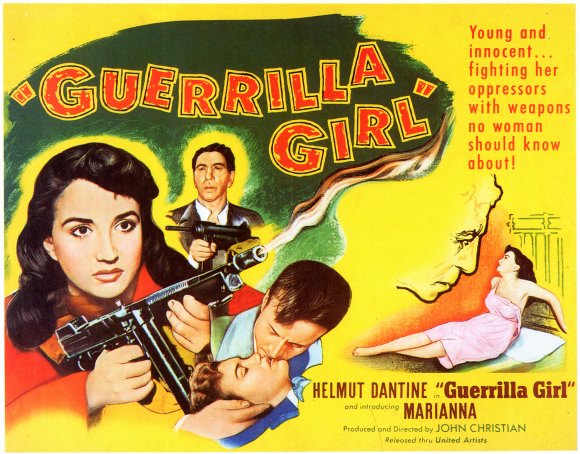One of Greek Cinema’s most popular films is Jules Dassin’s Never On Sunday (1960), the story of a well-admired woman (Melina Mercouri) in Athens’ port city of Piraeus, who follows her own rules and sets her own limits amidst its contemporary bustling, burgeoning metropolis. Although the earlier film Guerilla Girl (1953) has a similar woman at its core, it comes from much darker times: Greece’s German occupation during WWII, and the subsequent Greek Civil War. It was released by United Artists into darker times as well; at the height of the House Un-American Activities Committee and blacklist, and a matter of weeks after their release of their apolitical Moulin Rouge with collaborator José Ferrer had been picketed by the American Legion, a film that featured a critical yet ideologically ambiguous portrayal of the post-war Greek Communist Party must have been box office and career cyanide.
The film’s mysterious producer/director/editor John Christian (which seems very much like a Greek-translated nom-de-plume) never again was involved with a Hollywood production, according to IMDb. Nor was its exotic female lead, credited only as ‘Marianna’. Like other films of that period, notably High Noon (1952) and Salt of the Earth (1954), much of the drama of the HUAC ‘witch hunts’ can be seen in the plot, literally and figuratively (some scenes and dialog appear to have been altered in post-production, perhaps specifically with the committee in mind).
The film turns on Marianna’s character of Zaira, who is initially a Greek resistance fighter on the Greek island of Chios. She meets Dmitri Alexander (played by Helmut Dantine), an idealistic Greek army-intelligence officer also fighting the Germans (and the bourgeois concerns of his social circle). The two meet when Alexander is smuggled to the island in the course of a clandestine operation, and form an immediate romantic and intellectual bond. The winds of war soon intervene, and Zaira finds herself in a Nazi concentration camp, taking up with a group of hard-core Communists under one Comrade Vanda (Ray Julian – another blacklist candidate).
Upon the war’s end, the Communists seek to take over the Greek government, which Alexander still serves. This sets up a tense yet chaotic final act, as the lovers seek to reunite amidst the Athenian street fighting of the Civil War (interestingly, the biggest Machiavellian manipulator in this scenario is played by Michael Vale, whose later, greater claim to fame would be as the ‘Dunkin’ Donuts Guy’ — hard not to laugh when at one point someone says of his character, “No one knows what’s in his mind”).
One possibility the film survived to completion was the involvement of Dantine, who may have been considered untouchable due to a combination of financially powerful family ties and his own experience as a concentration camp survivor and orphan. Dantine had already made (among numerous other things) an un-credited appearance in Casablanca (1942) as the Bulgarian newlywed with the gambling problem, and would continue to pursue an unconventional Hollywood career, ranging from a role in War and Peace (1956) to appearances in Rod Serling’s Night Gallery series (1971) and Sam Peckinpah’s films Bring Me The Head of Alfredo Garcia (1974) and 1975’s Killer Elite which he also helped produce.
You might also like:
Gotta Watch: The Viking
Gotta Watch: Embryo
Gotta Watch: Night of the Living Dead


